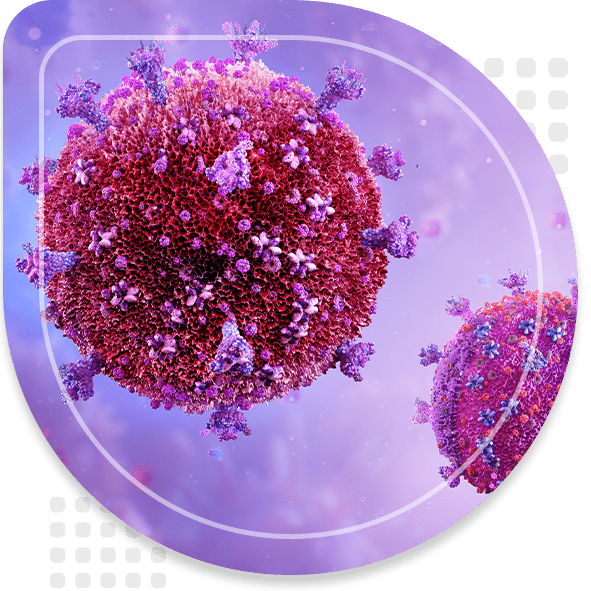STDs/STIs
Sexually Transmitted Infections
Though some STIs are chronic and lifelong, the symptoms can be managed, and many STIs can be easily cured with the right treatment, but the key is prompt diagnosis. At Gynecology Associates of Gwinnett, we recommend regular STI testing for anyone who is sexually active and is not monogamous, though we also encourage you to visit us if you suspect that you have been exposed to an STI, regardless of when your last test was performed.


Chlamydia
As a bacterial infection, chlamydia can be cured with prescribed antibiotics. However, if left untreated, in women it can cause pelvic inflammatory disease (PID), lead to infertility, and cause a dangerous ectopic pregnancy (a pregnancy which occurs outside the womb). If symptoms occur, they may include a burning pain during urination, abnormal discharge from the vagina, or for men, pain and discharge.
Gonorrhea
Like chlamydia, Gonorrhea is caused by a bacteria. The infection can occur in the genitals, rectum, or throat, and while many patients do not have any symptoms, those who do may experience burning during urination, abnormal vaginal discharge and bleeding, or for men, pain and discharge. A rectal infection can cause discharge, anal itching, soreness, bleeding, or pain during bowel movements. Though gonorrhea can be treated with antibiotics, it can lead to pelvic inflammatory disease (PID) in women and a painful condition in the tubes attached to a man’s testicles if left untreated.
Genital Herpes
The herpes virus can cause occasional outbreaks of sores and blisters on the lips, genitals, or anus. However, not everyone infected with genital herpes will have symptoms. Though the sores disappear for periods of time, the virus can still be spread between outbreaks. Genital herpes cannot be fully cured, but medication can reduce the severity and frequency of outbreaks while also making the virus less contagious.
Human Papillomavirus (HPV)
There are many different strains of HPV, and while many are non-sexual (such as those which cause warts on the hands or feet), around 40 strains are sexually transmitted. Some strains are actually eliminated by the body’s immune system, but a few high-risk strains can lead to genital warts or cervical cancer. Most strains of HPV will produce no symptoms.
Syphilis
As a bacterial infection, syphilis can be cured with the appropriate treatment, but early diagnosis and regular testing is crucial because, if left untreated, it can lead to serious and even fatal health complications. In its early stages, syphilis can appear as a painless sore, while later stages can cause a rash on the soles of the feet and palms of the hands, as well as flat warts and flu-like symptoms.
Human Immunodeficiency Virus (HIV)
HIV is a serious condition caused by a virus which weakens a patient’s immune system. While the virus is manageable with specific medications, it should be diagnosed and treated early because it can progress into a more serious condition called AIDs. Symptoms are often not present with HIV, especially in its early stages, so regular testing is crucial for all sexually active and non-monogamous patients.
Trichomoniasis
Though it’s very common, few patients are aware of trichomoniasis, a parasite which can be transmitted through sexual contact. For men, symptoms typically include an itching or burning sensation in the penis, burning after urination or ejaculation, or discharge from the penis, while women tend to experience itching, burning, redness, or soreness in the genitals, urinary discomfort, or a thin vaginal discharge which is thin and has an unusual smell. Trichomoniasis can be cured using antibiotics.
While it is best to receive regular STD/STI testing regardless of whether you’re experiencing symptoms, you should also contact us at Gynecology Associates of Gwinnett to request an appointment if you think you may have come in contact with an STI, even though you may not be due for another testing for several months. All STIs have treatment options, and some can be cured, but many can still cause lasting damage to your health if treated too late.
STD/STI FAQs
Fortunately, there are many ways to protect yourself from STIs. Avoid having sex with people whose histories you don’t know or who haven’t recently been tested for STIs; use a latex condom every time you have sex; avoid high-risk sexual activity, such as those which can lead to tears or breaks in the skin; and get vaccinated for STIs which have this option available, such as HPV. However, none of these options are 100% effective, so consistent STI testing is important even for those who avoid unprotected sex.
Technically, these two terms mean the same thing. STD (or sexually transmitted disease) is the more commonly known term. However, because a person can be infected with a virus or bacteria without necessarily having a disease, the term STI (or sexually transmitted infection) is now the more accepted medical term.

